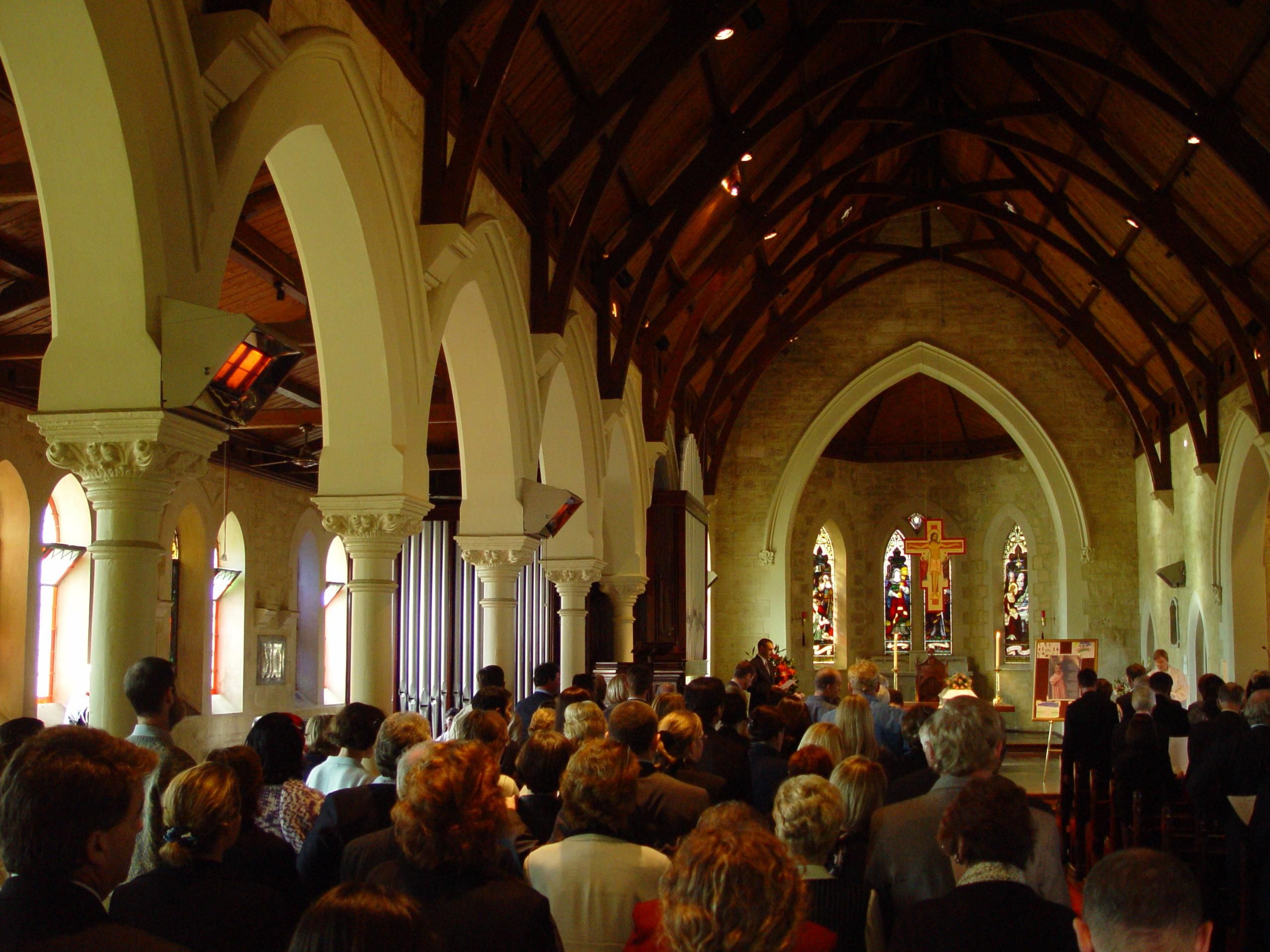I recently made a post to explain why we give specific attention to Generation X, those born between 1961-1981 (using Strauss and Howe’s  methodology), on this site. One of the points in that article was that GenX has come to recognize the role that religion plays in society. In fact, I would go so far as to state unequivocally that Christianity is absolutely required for a healthy society. That does not mean that every single person must be an active Christian, but rather that the underlying ethos or foundation of a healthy society is built upon Christian principles.
methodology), on this site. One of the points in that article was that GenX has come to recognize the role that religion plays in society. In fact, I would go so far as to state unequivocally that Christianity is absolutely required for a healthy society. That does not mean that every single person must be an active Christian, but rather that the underlying ethos or foundation of a healthy society is built upon Christian principles.
I pointed out that Xers are half as likely as Boomers to reject the Christianity in which they were raised and view Christianity as a vital component of Western Culture. I would like to expand on this point a bit more.
According to Pew Research, 70% of Xers identify as Christian (of one sort or another). Only 7% identify as atheists or agnostics. Admittedly, 17% are not sure exactly what they believe, but it is evident that the vast majority have hitched themselves to a Christian worldview. 84% of Xers have a serious belief in God, being absolutely (or fairly certain) that He exists. (Another 5% think God probably exists, but are not exactly certain, so if you add them in, we get to 89% who have at least some semblance of a belief in a Higher Power).
That same article points out that 78% of Xers see their religious views as being an important part of their lives, and 69% attend religious services at least once per month. 56% pray at least daily, and another 16% pray at least weekly.
This religous connection leads to contentment, with 73% of Xers reporting that they have some tangible sense of regular feelings of peace and well-being. 72% of Xers believe in heaven.
So what is it about this group that has latched onto Christianity? I mean, we were the “slacker” generation. In the late 1990s, there were numerous articles that lamented how many Gen Xers had rejected Christianity. So what happened to cause such a major shift?
 Well, first, the shift is probably overblown. What Xers were rejecting was the sentimental “feel-good” religion that was pushed on them in the 1970s and 1980s. Being confronted with images of flower children, sitting around a camp fire, holding hands and singing “Kumbaya” can elicit a visceral purgative reaction amongst Xers. I can remember the shallow, theology-devoid devotional songs that our Boomer youth leaders foisted upon us, and we hated them (the songs, not necessarily the people). So yes, Xers did reject that nonsense, but that does not mean they turned their backs on God or the Church.
Well, first, the shift is probably overblown. What Xers were rejecting was the sentimental “feel-good” religion that was pushed on them in the 1970s and 1980s. Being confronted with images of flower children, sitting around a camp fire, holding hands and singing “Kumbaya” can elicit a visceral purgative reaction amongst Xers. I can remember the shallow, theology-devoid devotional songs that our Boomer youth leaders foisted upon us, and we hated them (the songs, not necessarily the people). So yes, Xers did reject that nonsense, but that does not mean they turned their backs on God or the Church.
The linked article above, lamenting the Xer rejection of Christianity, actually points to what we viewed as more important that superficial buddy-Jesus. In fact, it raises some great points about the Christianity that Xers hold so dear:
- Christianity is about relationships. Xers are social animals. We learned to work together and rely on one another to weather life’s storms. Any religion that does not give proper focus to proper relationships is a no go for us.
- Christianity is a journey. We are not instantly “fixed” when we come up from the waters of baptism. I am not speaking about being saved here, but rather acknowledging that the same temptations exist post-baptism. We recognize that we are not going to be perfect on day 1, but our religion is seen as a journey and one we are willing to take.
- There is nothing wrong with change. Now, we appreciate things that work and do not want to change those things, but if you are participating in some religious program that is not working, we have no problem scrapping it and trying something else. Prior generations have a hard time with that. Once a program begins, it tends to become self-perpetuating, losing focus on what really matters. And really, isn’t the whole purpose of Christianity to change us? We become a “new man” in Christ.
- Character development matters. If religion is focused simply on showing up to check boxes: We sang, we prayed, we read scripture, etc., then it serves no purpose. Christianity must be transformative.
- A realistic view of family and friends. We spent our childhoods in homes where we tended to rarely see our parents. We have no illusion that they are perfect. We fully understand that they will disappoint us on occasion, but at the same time, family is the best option for support. Isn’t that what the Church is supposed to be? A family.
Now that is not the whole list from the article, and I would argue that some of the others are not really relevant to Xers. Of course, the research that led to the article came from a Boomer, so he was trying to interpret Xers to a Boomer audience, and I think he missed a few things. Also, the article is 20 years old and Xers have grown up since then. Some points might have been true when we were young adults, but are no longer representative who we have become (we do appreciate change, remember).
Second, GenXers are pragmatic. We do not want to waste time on useless busy work. If we did not believe the claims of Christianity were true, we would not adhere to the Church. We would look elsewhere. Yes, we can be cynical, but that cynicism allows us to see through the smoke screen of charlatans. The very fact that the vast majority of Xers are devoted to Christianity is strong evidence that there is something of value to be found there.
We recognize that the drift away from Christianity over the past 150 years (and especially in the last 60) has led to a breakdown in society. It  is often claimed that GenX is less educated than both Boomers and Millennials, and if you want to talk about college degrees, that is true. But if you equate education with knowledge, rather than a framed diploma, then I would argue that Xers are one of the most educated generations in many, many years. Much of our education was learned the hard way, by living life and learning from our mistakes. It was hard earned, but it has stuck.
is often claimed that GenX is less educated than both Boomers and Millennials, and if you want to talk about college degrees, that is true. But if you equate education with knowledge, rather than a framed diploma, then I would argue that Xers are one of the most educated generations in many, many years. Much of our education was learned the hard way, by living life and learning from our mistakes. It was hard earned, but it has stuck.
If you consider the Xer tendency to shy away from wasting time, you realize that many eschewed a college education because they saw little value in it. Who wants to take a class on gender studies or be forced to take a class that berates men for some SJW view of the failures of patriarchy? Not Gen X. So we skipped it and read books. I have had better conversations on historical topics with other Xers (many not college educated) than I have ever had with Boomers (and don’t even get me started on the history-retarded Millennials). [Caveat: I am one of those Xers with multiple graduate degrees, so I do not really fit that stereotype, but I will say that my collegiate experience supports this view. Most college profs I know have very little useful knowledge about how the world works]. This is one reason why the argument, “but, I have degree in such and such a discipline,” carries little weight with us. Give us facts, not credentials.
So if we understand that Xers are not stupid or uneducated in any way that really matters, we can understand that by experience and a study of history, we have learned that without Christianity, society is doomed. Some of us learned this via personal experience. We drifted away from the Church, lived a hedonistic lifestyle, and realized that it led to nowhere. Some of us never left our faith, and simply formed our views by studying, because yes, Xers study. We are insatiably curious. We are always looking for ways to improve and adapt to be more efficient. There is nothing more efficient in changing individuals or society than Christianity. In fact, it is the only way.
And that is why Generation X goes to Church and why we encourage you to do so, as well.










5
Ongoing debate/mission over at Vox Popoli to expose the empty boomer hipster cult of personality that is Jordan Peterson. Vox Day, a Gen Xer like myself, have been the first generation to see the diverging from the past prosperity, unity and aspiration into what it is today (competing ethnic groups, degenerate shallow entertainment, media hypocrisy and deception, rising state uselessness etc).
We don’t feel responsible for these losses, rather feel we should warn others about how it could be better instead of accepting the current status. We strongly support Trump as a possible salvation (for lack of a better word) from the corruption of the Reign of Obama the Hussein and Neoconnery.
Yes, we are fairly well informed about what happens at VP.
“I can remember the shallow, theology-devoid devotional songs that our Boomer youth leaders foisted upon us, and we hated them.”
You can call it an orchestrated childishness, and it extended well beyond singing, into preaching and teaching.
5
The counter-cultural movement yielded nothing of value and poisoned many things that had value.
Gen-X saw and remembered. What a lot of these “What makes Gen-X tick?” miss that we are rebels with a cause, and that cause is pragmatism. The hippies destroyed and perverted, so we rebelled against their false teachings and found some form of Christianity, and discovered that it works to build things of value.
@Theophrastus
(Awesome name, BTW) “Yes, we are fairly well informed about what happens at VP.”
Heh, isn’t Nate one of MoTW founders? If so, then yeah, I’d be inclined to suspect an organization that was partly founded by the very first (including the #001 designation, if I recall correctly) VFM would have a pretty solid grasp of the goings-on at Vox Popoli. *grin*
Y’all are doing God’s work, as far as I’m concerned, and I pray God blesses you abundantly for it. I know your wisdom has been a boon and blessing to me, at least. Thank you.
Ha. Most of us were around long before VFM was ever thought of. We appreciate your kind words.
I’m a Boomer born to Silent parents. I never bought into the Boomer BS before my conversion to Christ, and despise it in church after conversion. The sooner they’re gone, the better…well, except for me.
5
Reread this today. We are involved in an undertaking that is no less than the re-establishment of Christendom. It reached its pinnacle in many ways just before WWI, but the seeds of its destruction were sown before that. A century later, it is up to us to bring it back
Yes. That is correct.